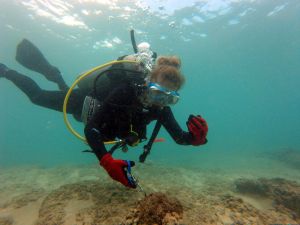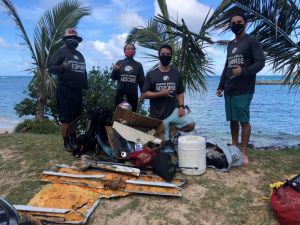

Nonprofit shares in $50K grant to reduce marine debris, protect sea turtles, seabirds, and monk seals
August 25, 2021
Hawai‘i Sea Grant and Hawai‘i Marine Animal Response (HMAR), the largest Hawai-based marine species response and conservation nonprofit organization, have received $50K from NOAA Sea Grant and the NOAA Marine Debris Program to address the devastating impacts of marine debris in the coastal environment, one of the leading causes of injury and death for sea turtles, seabirds, and Hawaiian monk seals. This grant is matched by $50K from non-federal sources.
The funding announced today is one of six new, creative projects to tackle marine debris challenges across the country awarded to Sea Grant programs in Hawai‘i, Florida, Georgia, Illinois-Indiana, Puerto Rico, and Wisconsin. These marine debris projects total $300,000 in federal funding and are matched by non-federal contributions, bringing the total investment to approximately $600,000.
“By preventing marine debris, we can reduce the impacts of this global problem,” stated NOAA Marine Debris Program director Nancy Wallace. “We are pleased to partner with NOAA Sea Grant to provide support for projects that will help stop trash and fishing gear at their source.”
In Hawai‘i, HMAR’s multi-part project incorporates shore-based and underwater marine debris collection, community outreach, school education, and a statewide citizen-science project called Beat Debris which encourages recreational divers to safely remove marine debris and recreational fishing gear, and to report the materials collected so that the data can be collated and analyzed.
“HMAR is excited about the opportunity to partner with the Hawaiʻi Sea Grant Program and honored to have been awarded this highly competitive grant. Marine debris poses a large and pervasive threat to protected marine species including sea turtles, seabirds, and Hawaiian monk seals, as well as other parts of our shared ocean ecosystem such as coral reefs” said Jon Gelman, the President of Hawai‘i Marine Animal Response.
Marine debris can include the trash we throw away every day such as plastic bags, cigarette butts, foam take-out containers, and balloons that end up in the marine environment. It can also range greatly in size from small pieces of plastic that can’t be seen with the human eye, to large derelict fishing nets and abandoned and derelict vessels. These items become marine debris as a result of littering, dumping, ineffective or improper waste management, and disasters, and can have many adverse effects on wildlife, the environment and coastal communities. Importantly, lost or abandoned recreational fishing debris such as monofilament fishing line, hooks, lures, weights, traps and nets cause a significant number of injuries and deaths to protected marine animals in Hawaiʻi’s near-shore ocean environment.
To help align the projects with the NOAA Marine Debris Program’s Strategic Plan and Regional Marine Debris Action Plans, the Marine Debris Program’s regional coordinators will collaborate with project leaders throughout the award period. The project activities begin this summer and will continue for up to two years.
See the full list of projects (here)
“The continued effort between Sea Grant and the Marine Debris Program leverages the strengths of both programs to effectively address marine debris challenges nationwide,” noted National Sea Grant College Program director Jonathan Pennock. “We look forward to seeing the implementation of these new and creative strategies for marine debris prevention.”
This is the second year that Sea Grant and the Marine Debris Program offered a joint funding opportunity. Projects funded in the first year of this partnership aimed to reduce marine debris across the U.S.
The University of Hawaiʻi Sea Grant College Program is part of the University of Hawai‘i at Mānoa’s prestigious School of Ocean and Earth Science and Technology. It supports an innovative program of research, education and extension services directed to the improved understanding and stewardship of coastal and marine resources of the state, region and nation. Science serving Hawai‘i and the Pacific since 1968.

